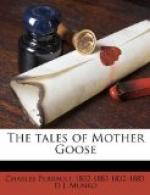“If a man of no wit and sense,” replied Riquet with the Tuft, “would be well received, as you say, in reproaching you for breach of your word, why will you not let me, madam, have the same usage in a matter wherein all the happiness of my life is concerned? Is it reasonable that persons of wit and sense should be in a worse condition than those who have none? Can you pretend this, you who have so great a share, and desired so earnestly to have it? But let us come to the fact, if you please. Putting aside my ugliness and deformity, is there anything in me which displeased you? Are you dissatisfied with my birth, my wit, my humor, or my manners?”
“Not at all,” answered the Princess; “I love you and respect you in all that you mention.”
[Illustration: “I am exact in keeping my word.” p. 61.]
“If it be so,” said Riquet with the Tuft, “I am happy, since it is in your power to make me the most amiable of men.”
“How can that be?” said the Princess.
“It is done,” said Riquet with the Tuft, “if you love me enough to wish it was so; and that you may no ways doubt, madam, of what I say, know that the same fairy who on my birthday gave me for gift the power of making the person who should please me witty and judicious, has in like manner given you for gift the power of making him whom you love and to whom you would grant the favor, to be extremely handsome.”
“If it be so,” said the Princess, “I wish with all my heart that you may be the most lovable prince in the world, and I bestow my gift on you as much as I am able.”
The Princess had no sooner pronounced these words than Riquet with the Tuft appeared to her the finest prince upon earth, the handsomest and most amiable man she ever saw. Some affirm that it was not the fairy’s charms, but love alone, which worked the change.
They say that the Princess, having made due reflection on the perseverance of her lover, his discretion, and all the good qualities of his mind, his wit and judgment, saw no longer the deformity of his body, nor the ugliness of his face; that his hump seemed to her no more than the grand air of one having a broad back, and that whereas till then she saw him limp horribly, she now found it nothing more than a certain sidling air, which charmed her.
They say further that his eyes, which were squinted very much, seemed to her most bright and sparkling, that their irregularity passed in her judgment for a mark of the warmth of his affection, and, in short, that his great red nose was, in her opinion, somewhat martial and heroic in character.
However it was, the Princess promised immediately to marry him, on condition that he obtained the King’s consent. The King, knowing that his daughter highly esteemed Riquet with the Tuft, whom he knew also for a most sage and judicious prince, received him for his son-in-law with pleasure, and the next morning their nuptials were celebrated, as Riquet with the Tuft had foreseen, and according to the orders he had given a long time before.




